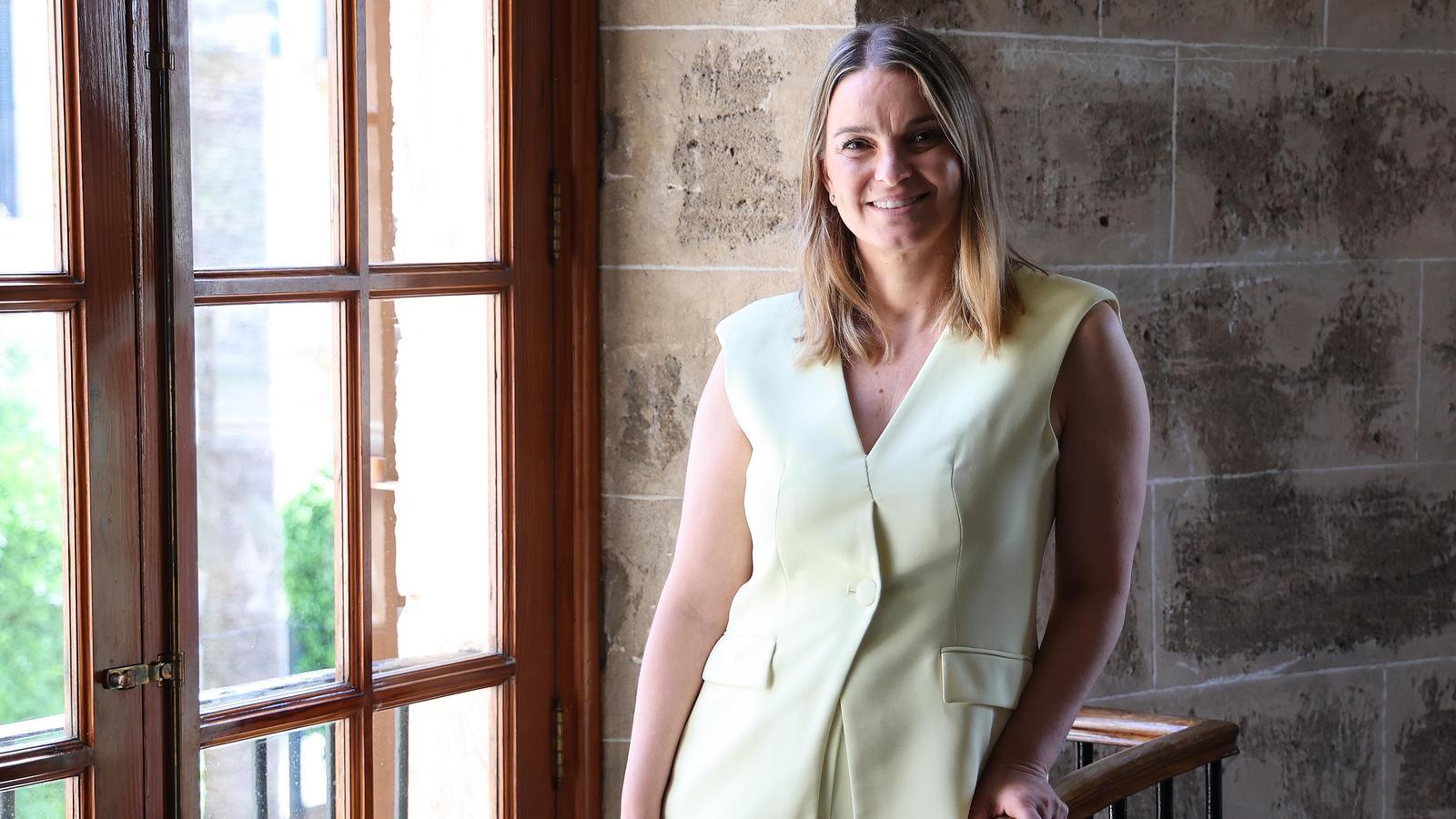Marga Prohens: "I don't agree with Vox, MÁS, or the PSIB on language."
President of the Government


PalmMarga Prohens (Campos, 1982) arrives atmidway through a turbulent legislature In this context, it has been forced to give in to Vox and accept the reality of overcrowding and housing shortages. After a legislative sprint, the government's restructuring marks the beginning of the countdown to the 2027 elections.
The change of era is evident: is it clinging more to Vox, as the left claims?
— This is a constant falsehood that the left needs to cover up the institutionalized corruption it has on the Iberian Peninsula. It has a very short lifespan. Calling Sandra Fernández [the new Minister of Families and Social Affairs] far-right... She's the Minister who brought social agreement to the Islands. Calling Antònia Maria Estarellas [Second Vice President and Minister of the Presidency] radical is trying to confuse things: she's a moderate woman, with a great capacity for dialogue. Or Catalina Cabrer [Minister of Labor], when the unions themselves have come out to congratulate us on the appointment, because she has been instrumental in resolving various labor disputes. They're confusing it with what they would like, a lopsided government. But it's never been that: it's a government of centrality. Yes, of change. If they think that by coming out behind two banners and shouting at me I'll betray my voters or my platform, I won't do it.
What is the reason for the appointment of a national police officer [Manuel Pavón] as the new head of Immigration?
— We needed a technical profile, one familiar with the challenges of integrating regular immigration. If anyone knows this, it's Manuel Pavón, until now the spokesperson for the Insularidad Digna platform, which has always called for greater funding for immigration. We're struggling to address the massive influx of irregular immigration to our shores. We don't have jurisdiction over this phenomenon, but we do have a lot to say.
You've removed the director general of the Ministry of Family and Social Affairs. Has immigration management motivated the restructuring of the department?
— When you restructure the entire government, you change many things. It's been said that this change was a demand from Vox: I want to categorically deny that.
Why did you dismiss Councilor Catalina Cirer?
— It wasn't a dismissal, but rather a negotiated exit. The reasons remain between us. I did it with great sadness, because I have absolute affection for him. I asked him to make an effort, to help me put order in the regional government. I must thank him for these two years.
You're two years into your term. What's been the most difficult moment?
— When I had to withdraw the budget. When you've been negotiating for months, you discuss the most important law of any government at different levels, and two things happen. First, Vox's national strategy, which doesn't depend on me and involves leaving all the regions governed by the minority PP without a budget. Then, a negotiation is added, imagine driven by that strategy, entrenched in issues on which I neither can nor want to give in. Red lines I couldn't touch. Therefore, the circumstances weren't right for the negotiation to continue. It's still a failure: a one-off one, which we were able to resolve later. But December was a tough month.
Are you considering requesting funding like the one Catalonia is negotiating?
— We must be very firm with the separatist quota, because we are a contributing community. When the common fund breaks down, and one of the three contributing communities stops contributing to the system and does so, moreover, without the backs of the rest of the communities, two things can happen: the communities that receive it can renounce public services, or we can be required to contribute more to Madrid and the Islands. You will find me here, with all the consequences and through all means, because I will not raise taxes on the citizens of the Balearic Islands so they stop paying.
Catalonia has requested that other communities be allowed to join.
— What the Catalan government should do is request this from a fiscal and financial policy conference. President Pedro Sánchez said he would convene our Treasury ministers, but he hasn't. There's no financing system on the table. There's a bilateral agreement, not to improve Catalonia's financing—no one believes that—but to keep Sánchez in the Moncloa Palace for another week or until the judge comes looking for him. It's not serious. What are we asking for? We represent, more than anyone, a Spain that's filling up, with demographic growth and pressure on public services, the territory, and natural resources. This must be recognized, as well as the floating population and the principle of ordinality. I believe in a single fund, but we can't continue to be the second in contributing and last in receiving resources from the State.
You asked for time to gather figures on overcrowding. Do you have them yet?
— We have the figures and the measures. The Pact for Sustainability has collected more than 540 proposals from more than 100 organizations. It now begins its second phase, with the Social Dialogue Roundtable as its focus. These working groups, with unions and employers' associations, will produce agreed-upon measures. I trust that they will then have the necessary votes in Parliament.
Which ones? Vox rejects the increase in the ITS.
— Those of Vox and the left. We are the first president to say we've reached a limit with tourism. Because the opposition makes very good points, but the important thing is what you do when you govern. The first containment decree I issued, which prohibits the expansion of vacancies or the creation of more multi-family tourist rentals, which increases penalties for illegal tourist rentals, was supported by Vox, not the left.
The left presented measures arising from the Pact for Sustainability, and the PP voted against them.
— There was no willingness to negotiate when they were presented, beyond marketing. I ask that I be allowed to approve the proposals that emerge from the consensus of the Social Dialogue Roundtable.
Have you received pressure from hoteliers?
— Pressures are coming from all sides. All economic sectors are coming to defend their interests. It's legitimate and logical. That's why I value the Sustainability Pact, because we've sat down and listened to each other's interests.
Many entities and parties have withdrawn from the Pact for Sustainability.
— Because perhaps they didn't understand that they didn't have the absolute truth. The Pact required an exercise in humility. Transformation isn't about saying: I want the devourer to do this or decrease that way. It's about: what can I do? There are entities that have understood this, and others that haven't.
In terms of housing, the islands are a limited territory by definition. To what extent can prices be regulated solely through construction?
— What we can't do is deceive people. We've grown by more than 110,000 people: not tourists, but residents. Thirty thousand homes have been built. The housing emergency stems from that. When the first signs of this appeared, during the last legislative term, it was time to act, and now we could talk about starting to reap the rewards. We're making greater and better use of the land. We're a small territory: the land we have is what it is, and much of it is protected. And it must remain that way, because it's the best legacy we can leave.
So why have you approved urban planning amnesties, even in the Tramuntana mountains?
— These regularizations do not involve further construction.
But they validate a person who has built illegally.
— No. There are strict penalties and conditions for regularization. They provide security for the people who live there. They involve environmental requirements, septic tanks, and landscaping projects. This government doesn't turn its back on problems. When I have thousands of homes that are out of compliance, I have a problem, because they can't be demolished.
Why is rural construction permitted when there is still developable land?
— A transitional area is not a rural area: it is designed to be developed over time. Those identified, for example, in Palma, were not painted by the People's Party (PP), but by left-wing parties during the last legislative term. Five years of legal residency will be required to access them.
You've made concessions to Vox, such as the introduction of vehicular Spanish. Do you fear a hot September in the classrooms?
— I ask for consistency, because there are parties that are now criticizing it and that in 2022 voted in favor of introducing vehicular access into the Education Law. We comply with court rulings. Vox's demand is public, and it doesn't correspond to the Catalan government's position. We have reached this agreement without touching the Normalization Law, the Minimum Decree, or the language projects of the schools.
Don't you think having a partner who is aggressive about their own language, who denies that a Mallorcan is Catalan, contributes to social confrontation?
— Despite the interests of some and others seeking confrontation, there is no linguistic conflict. Bilingualism is lived normally. It should be that way. Language can never be an element of politics or confrontation, because it is not the heritage of either side, but of those who speak it. We have our own language, recognized in the Statute of Autonomy, and the Government has certain obligations. The nationalist parties that make language their banner of confrontation are the ones who have done the worst, because they only identify it with one political option. For example, the majority of young people do not identify with radical left, radical nationalist, or pro-independence parties, and they stop using the language for political reasons.
Isn't Vox a nationalist party that uses language to confront?
— I disagree with the approach taken by Vox, MÁS, and the PSIB (Spanish Socialist Workers' Party), which long ago became a nationalist party. I'm in opposition, because when they govern, they remove the Catalan requirement for positions they're interested in. In fact, the PSIB's proposal wasn't to introduce the vehicular language requirement for Spanish into the law, but rather to implement percentages: a mandatory 25%. I'm in the opposite camp.
Miguel Tellado also defended the formula of a PP government with external support from Vox.
— I haven't done badly. Although Vox was demanding to join the government, we stood firm on this principle. It hasn't been easy, but the turmoil, conflicts, and crises have demonstrated two things. First, the principles of the government have remained intact. If it were like Sánchez, whose principles change depending on the votes he needs, there wouldn't have been a crisis. Second, both the PP and Vox have been able to put what we have in common first. Furthermore, the balance of power was maintained in the negotiations. The formula proposed by Tellado has allowed us to pass all the laws.
What will the national People's Party (PP) say when they call for a curb on tourism or greet you in Catalan at the Conference of Presidents?
— I've always found respect. The PP is very diverse. Borja Sémper, to whom I send a huge hug, said: "This is a party, not a sect." Alberto Núñez Feijóo, who comes from Galicia and knows the outskirts of Madrid, echoed the same sentiment. When I took over the Balearic PP, I said I wanted to rebuild a party with broad majorities. This needs to be done from a focused PP.
How do you assess the recent indictment of former minister Cristóbal Montoro?
— We're talking about matters that date back almost ten years and involve people who are no longer active in politics. The information I have on this case is very limited. We express the utmost respect for the judicial proceedings.
